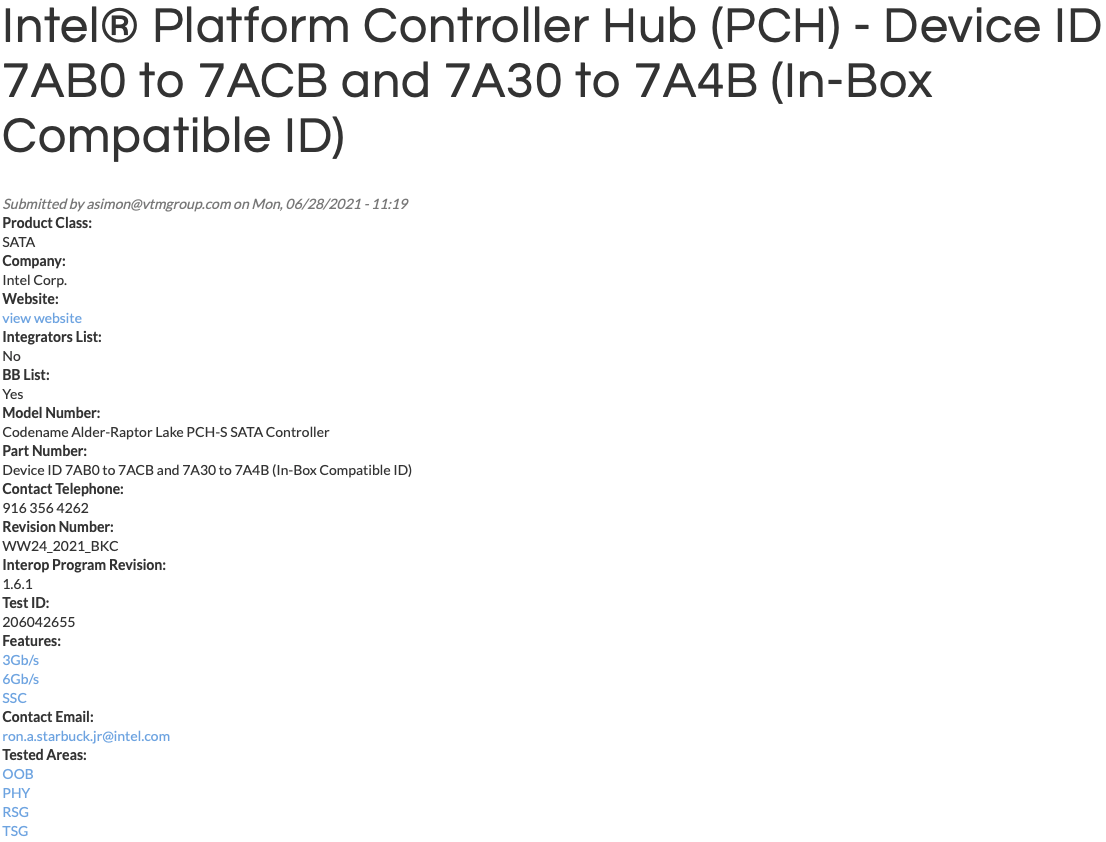Intel Confirms Alder Lake & Raptor Lake Compatibility
600-Series is good for at least two generations
While some signs from Intel pointed to compatibility between platforms for Intel's upcoming Alder Lake and Raptor Lake processors, the evidence is now overwhelming. Based on a document filed with the industry standards committee SATA-IO, Intel's upcoming 600-series chipsets will support both Alder Lake and Raptor Lake processors.
Last month an Intel contractor submitted compatibility testing results for the company's upcoming "Alder-Raptor Lake PCH-S SATA Controller" to SATA-IO (via @Komachi_Ensaka), an organization that oversees and supports the SATA specification. The document covers Intel's Platform Controller Hubs (PCHs) featuring 7AB0, 7ACB, 7A30, and 7A4B device IDs, which are probably the company's 600-series chipsets for desktops and laptops.

The controller's name confirms that Alder Lake and Raptor Lake CPUs can use the same chipsets, in this case, Intel's 600-series PCHs. Meanwhile, compatibility with a chipset does not automatically mean drop-in compatibility of any Raptor Lake CPU with any Intel 600-series motherboard, as there are other considerations.
Intel's Alder Lake is the company's first hybrid processor for mainstream PCs. The CPUs will come in an LGA1700 packaging and integrate up to eight high-performance Golden Cove cores and up to eight energy-efficient Gracemont cores. The chips will also support DDR5 memory and a PCIe 5.0 interface. Intel's codenamed Raptor Lake processors will succeed Alder Lake sometime in 2022 and will feature higher performance. Meanwhile, the exact differences between Alder Lake and Raptor Lake platforms are unknown.
An unconfirmed rumor has it that Intel's 600-series chipsets themselves will not bring PCIe 5.0 connectivity, but will continue to support PCIe 4.0. Yet Since Alder Lake CPU will support PCIe 5.0, the platform will bring this technology to the market. So if the rumor about the lack of PCIe 5.0 support by Intel's 600-series chipsets is correct, then support for PCIe 5.0 would be a natural improvement for Raptor Lake's 700-series chipsets. But of course, that's speculation.
Before shipping any platform or product, Intel has to ensure its compatibility and/or compliance with various industry standards and fill in applicable documents with appropriate standard setting bodies. SATA-IO is one such organization. Typically, such groups publish information about compatibility and compliance test results on their websites to enable makers of hardware to ensure the compatibility of their products with products manufactured by other companies. As a result, it's inevitable that organizations like SATA-IO, PCI-SIG, and USB-IO reveal details about unreleased products.
Get Tom's Hardware's best news and in-depth reviews, straight to your inbox.

Anton Shilov is a contributing writer at Tom’s Hardware. Over the past couple of decades, he has covered everything from CPUs and GPUs to supercomputers and from modern process technologies and latest fab tools to high-tech industry trends.
-
watzupken I certainly hope this is the case. When Intel came out with the socket 1200, people had the impression that older 400 series boards is good for 2 generations of CPU as well. As we now know, that is not true as not all the chipsets have the ability to support Rocket Lake due to some lame reason that Intel came out with like before.Reply -
mdd1963 I see this feature (ability to upgrade on same mainboard) as of limited utility for most folks; if your CPU is a candidate for 'needing yet another upgrading again' in but a year or less time, many might suspect it likely was 'not enough' when you purchased it. (I suppose onecould choose a mythical 12100 and then a 13700 a year later just to make such a 'plan' ...work)Reply -
JfromNucleon Reply
Technically, all 400 series chipsets can support Rocket lake, just not all can support PCIe 4.0 but then again, I could be wrongwatzupken said:I certainly hope this is the case. When Intel came out with the socket 1200, people had the impression that older 400 series boards is good for 2 generations of CPU as well. As we now know, that is not true as not all the chipsets have the ability to support Rocket Lake due to some lame reason that Intel came out with like before.